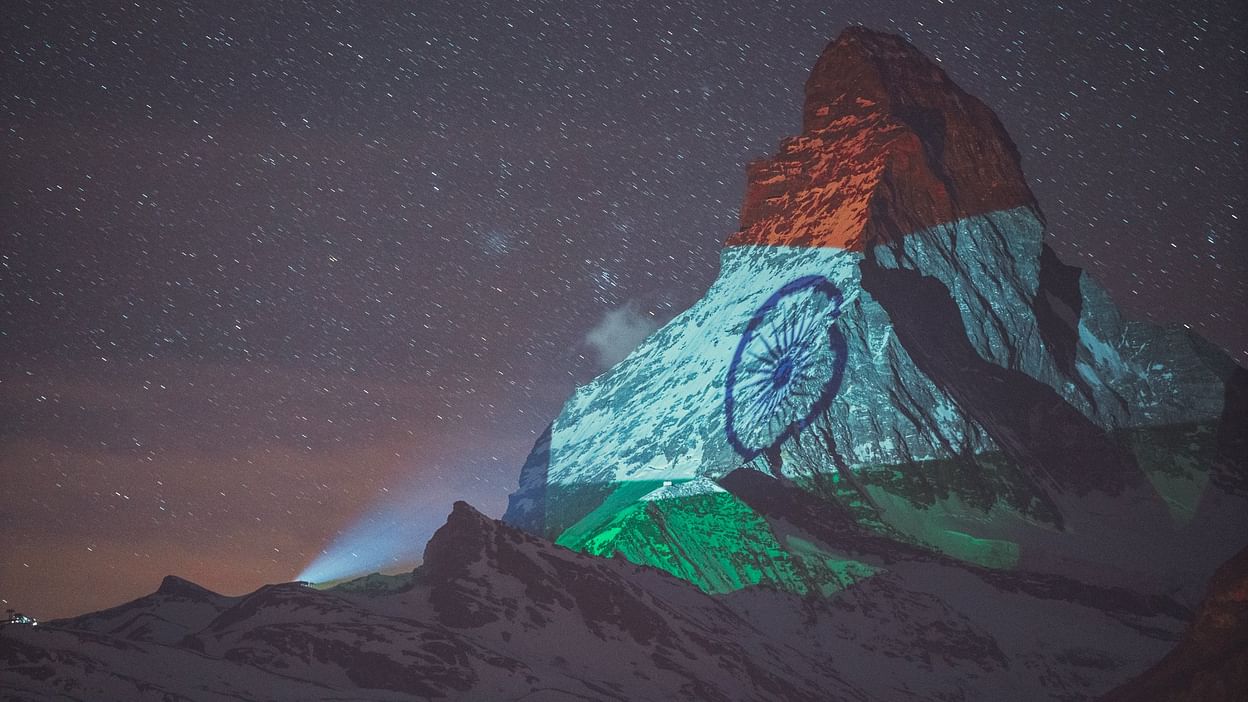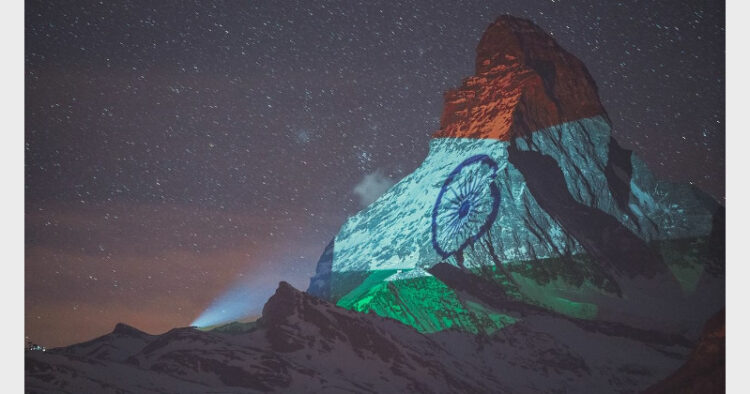
Dr Swadesh Singh
RSS Sarsanghchalak Dr Mohan Rao Bhagwatji said at an online session on Sunday that while COVID-19 presents a huge humanitarian crisis, it also brings an opportunity for India. He was talking about the opportunity to create a new sustainable world order where Indian ethos can play a big role. The address received a rousing response and was lauded by the intellectual community. It also remained the top social media trend for the next many hours. In this light, it becomes essential to analyze and ponder over the points outlined by Bhagwatji.
The world today is in the grip of the highly contagious COVID-19 infection for which a cure has not been found as yet. Till date, no one knows the exact origin of the Novel Corona virus that causes this infection, though conjectures abound from bio terror to lab to bats. Similarly, the word on how to stop its spread is also a subject of much debate and discussion. However, the disease has brought the world to a standstill. In history, this year is going to be defined by images of thousands in hospitals awaiting a cure and bodies outside awaiting disposal. The markets have crashed and international world order and organizations have lost relevance.
It is certain now that things are never going to be the same. Post COVID-19 we are bound to enter a new world order. What would be that world order? Who would lead it? What would be its parameters? These are the important questions of the coming times. The Western-Liberal-Democratic tradition which believed in a holistic role of the welfare state – spanning all subjects of the citizens – has failed. The United States of America, that till now attached exceptional value to the life of each of its citizen, is now thinking on other issues. The American economy is now being seen as more important than the life of American citizens and efforts are being made to break the lockdown. The alternative ideology of Communism adopted by China has displayed shocking irresponsibility and committed the biggest blunder of our times by hiding the information about the virus. The iron curtain behind which the country operates has ensured that no one knows for sure how the virus emerged in Wuhan province, how many were infected, and how it spread in the world. In its attempt to trump the US from its position as the world leader, the Chinese dragon breathed fire down the whole world bringing it to its knees. The third block comprising Islamic countries also failed the humanitarian test in this crisis by continuing to treat migrants and minorities as second-grade citizens and refusing to shoulder their responsibility.
The total COVID-19 patients in the world are around 30 lakh with around 2 lakh fatalities. India, which is no less than a continent itself, has 30,000 cases and around 1,000 deaths so far; and seems to be doing far better in comparison. Barring exceptions like Tablighi Jamaat, almost the entire population has cooperated with the government guidelines even when it cost them dearly in terms of money, liberty, and comfort. This is also despite the fact that India’s public health infrastructure is not something one can be proud of. Though lakhs of daily-wagers have lost their jobs, people have shown great patience and understanding, unlike the US where protests are being staged. At the same time, government and voluntary organizations are taking care that no one should go empty stomach. The Sarsanghchalak in his address too dwelt on the essential role of Indian society and its people in this crisis.
So what is it that gives India lead over Western countries in this battle? While the Indian state has played its role, society too has stood up to support and help people. Along with police, doctors, nurses, sanitation workers, civil society has also pitched in against Coronavirus. Voluntary, social and religious organizations etc have come forward with their resources to feed and help the poor, daily-wagers and migrant laborers. Some stellar examples have been set by socio-religious leaders across the country such as leaders of Jain Dharma who have halted all temple construction actives for the next two years and have resolved to donate half of this fund to serve the needy. Similarly, in Haryana, the Radha Soami Satsang is feeding seven lakh people every day through their centers. Different business houses, religious bodies, and social organizations have donated with an open heart to the PMCares fund.
Society has always been the core of the Indian spirit. India moves with the power of its unique society which is multi-centered, has no unitary command system, and comprises multiple voices with equally diverse conscience keepers, yet a common understanding of values and ethos. The society works keeping in mind local conditions, geography, and cultural diversity. In the face of a crisis, the fundamental unity of the society gets uniformly reflected across all the segments even as each segment fights the challenge in its own unique way.
The Indian society became stronger over centuries due to its core philosophical principles and the primacy of the institution of the family. At the time of a pandemic when old people are languishing across the globe, our elderly people are taken care of by their families. The collective living of family also combats loneliness at a time when individuals are facing mental health problems. The Indian philosophical principles have never kept individuals at the centre for their material benefits. It believes in the co-existence of all living beings and has sought solutions to world problems keeping this balance in mind. The sages of India understood that every living creature supports the other and no one can be taken out of the equation.
No doubt, in the last 25 years we too have allowed ourselves to be overwhelmed by the glitter of globalization. As a result, we are increasingly shedding our roots, villages, and socio-cultural values to become global citizens. However, this COVID-19 crisis has given us an opportunity to introspect and rethink our role and the role of our country in the new world order.
Spirituality is the essence of this decentralized, multicultural Indian society. India and the West are anchored in their divergent ideas of ‘yours too’ and ‘only mine’, respectively. In the last few decades, we have seen the emergence of individualistic, consumerism-centered, West-inspired ideas typified by kickers like ‘Ye Dil Mange More’. Today, these ideas have come crashing like a house of dominoes. A tiny virus has brought the whole Western world to its knees shattering its model of growth. It has become clear now that the United Nations Security Council is a mere puppet in the hands of the most powerful player. In the current crisis too, China ensured that for a long time no meeting of the Security Council was held on the issue of COVID-19. The world has also seen the partisan role of WHO chief defending the Chinese position and giving out filtered information. The aspiration of some countries to become top power poles has brought the world on the door of doomsday.
In this scenario, its becomes India’s responsibility to show the way ahead with its centuries of thought rooted in spirituality, balance, and co-existence. But before we can take on that role, we must first overcome our own under-confidence. We need to reconnect with our indigenous knowledge tradition, lifestyle outlook and economic models. There is no doubt that the branches of knowledge that have originated in India will be more relevant than ever in the post-Corona world. Yoga, Ayurveda, Panch Karm, Siddha, Naturopathy besides the integral approach towards individual, family, society, nation-state, world and universe; the economic model based on decentralization and self-reliance and multi-centered religious order will be the tested, relevant and sustainable models for the new world order. Even today one can see that in different parts of the world people are following Indian societal norms of cremation, greeting with folded hands or Namaste and Yoga and Ayurveda to keep themselves healthy and free of disease.
The Sarsanghchalak talked at length on these lines in his address to the nation. He said that we need to rethink and start following the Indian lifestyle where the care of each living being, environment, water conservation, and sanitation is an essential part of daily life. He also stressed on an Indian economic model based on decentralization, self-reliance, and Swadeshi.
Today the Indian society is working hand in hand with the government with the ideals of ‘Sewa’ and sacrifice which should be followed across the world. This Indian society has faced tremendous challenges for hundreds of years and each time it has found answers within. This Corona crisis too is no exception. Once the Corona crisis is over we will be entering a new phase of a world order where India will have the chance to showcase its solutions to the world
(The writer teaches Political Science in Satyawati College of Delhi University)














Comments